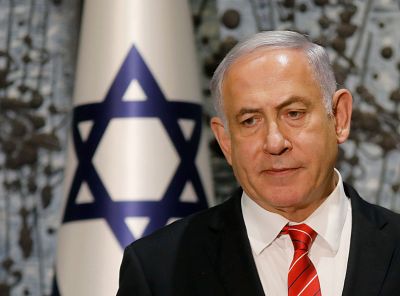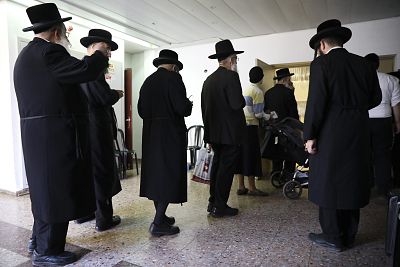With Netanyahu unable to form a government, the task now passes to Benny Gantz, who may face a similar fate.
TEL AVIV, Israel — After failing to form a government for the second time in two consecutive elections, Israel's longest-serving prime minister will now watch as for the first time in a decade someone not named Benjamin Netanyahu attempts to form a government.
In a ceremony on Wednesday evening Israel's president, Reuven Rivlin, will pass the political torch to Netanyahu's chief rival, former military chief of staff Benny Gantz who will have 28 days to form a government, after which if there is still no government a complex process could lead to an unprecedented third election in the space of a year.
And while it is astonishing for a leader such as Netanyahu to fail twice at forming a government — a first in Israeli history — anyone celebrating Gantz's victory may be doing so prematurely. After all, the obstacles Netanyahu faced will be no less a challenge for Gantz, a three-star general with no political experience prior to his entrance into politics ahead of the April election, which also ended in stalemate.
Gantz's centrist Blue and White party surpassed Netanyahu's right-wing Likud party in the September election — but his bloc of center-left parties was smaller than Netanyahu's right-wing bloc, giving Netanyahu the first chance to form a government.
Returning that undelivered mandate to the president was probably not how Netanyahu imagined celebrating his 70th birthday on Monday. Yet it came as no surprise in Israel, where the news cycle has focused for the last month on his lack of progress in establishing a government.
Analysts say the era of "King Bibi" the invincible leader may be coming to an end.
"Netanyahu's image as a magician, as the man who always wins elections, and who controls Israeli politics, is severely wounded," says Gayil Talshir, a political science professor at Jerusalem's Hebrew University. "It's clear that this is the end of the Netanyahu era. The question is how soon it's going to come."
While Israel is divided, analysts say polarization is not driving this gridlock. "When it comes to issues of great concern to Israelis, there really isn't a big ideological divide," says Yohanan Plesner, president of the Israel Democracy Institute (IDI), a leading Israeli research center.
Israel's political paralysis is more a manifestation of the unique situation facing Israel's leader.
"Netanyahu is about to be indicted on allegations of severe crimes on the one hand, but on the other hand he is still very popular among his political base and is committed to holding on to his power," says Plesner. "Without the Netanyahu factor, it's quite clear we would have seen today a functioning government."
According to a recent IDI poll, a majority of Israelis want a unity government between Likud and Blue and White. This is what Gantz and Netanyahu both claim to be working toward, yet their shared end does not reflect shared means.
Netanyahu failed to form a coalition because he insisted on negotiating as a bloc, representing his party and several ultra-religious parties. Gantz refused to negotiate under those conditions, as his party campaigned on forming a liberal government that would reduce the control of Israel's ultra-Orthodox minority over its secular majority.
For example, Israeli Jews can only marry through the ultra-Orthodox rabbinate, there is no public transportation from Friday afternoon through Saturday night, and most businesses are closed on Shabbat. Most Israelis are not ultra-Orthodox, and polls have repeatedly shown a desire to loosen these restrictions.
"Blue and White is determined to form the liberal unity government, headed by Gantz, that the nation chose a month ago," the party declared Monday night.
Another crucial obstacle to a unity government is Gantz's refusal to share power with a prime minister facing indictment. When Gantz refers to a unity government with Likud, he means a Likud that is not led by Netanyahu.
To accomplish that he needs an unlikely rebellion from within the Likud to replace Netanyahu as party leader. But Netanyahu has forced his party and its right-wing partners to sign several loyalty pledges vowing only to support him as their leader.
According to a new IDI survey released Tuesday, a majority of Israelis believe Netanyahu should resign. "This is obviously a message accepted by a broad majority of Israelis, but not yet internalized by the political system," says Plesner.
While a second election seemed unlikely back in April, Israelis are already dreading the possibility of a third. But according to Talshir and Plesner, this is what Netanyahu and the Likud are hoping for.
On Monday Netanyahu released a campaign video blaming Blue and White for leading Israel to a third election. "Gantz's chances at forming a government are not great because Netanyahu believes his best chance is a third election," says Talshir.
According to Plesner, the Israeli public has "no appetite for a third election campaign, especially since we know not much will change in a third election. At the same time there's no particular expectation that Gantz or Netanyahu or someone else will be able to form a government. So the public is in a state of confusion."
Gantz now has 28 days to form a coalition, and if anything or anyone will give, it will likely happen toward the end of that time period, says Plesner. It's not impossible that Netanyahu could even have another chance to form a government if Gantz fails.
After 38 years in the Israeli military, commanding soldiers in two Lebanon wars, every Palestinian uprising and all three wars with Hamas, Benny Gantz is now about to face what may be his toughest battle yet.













